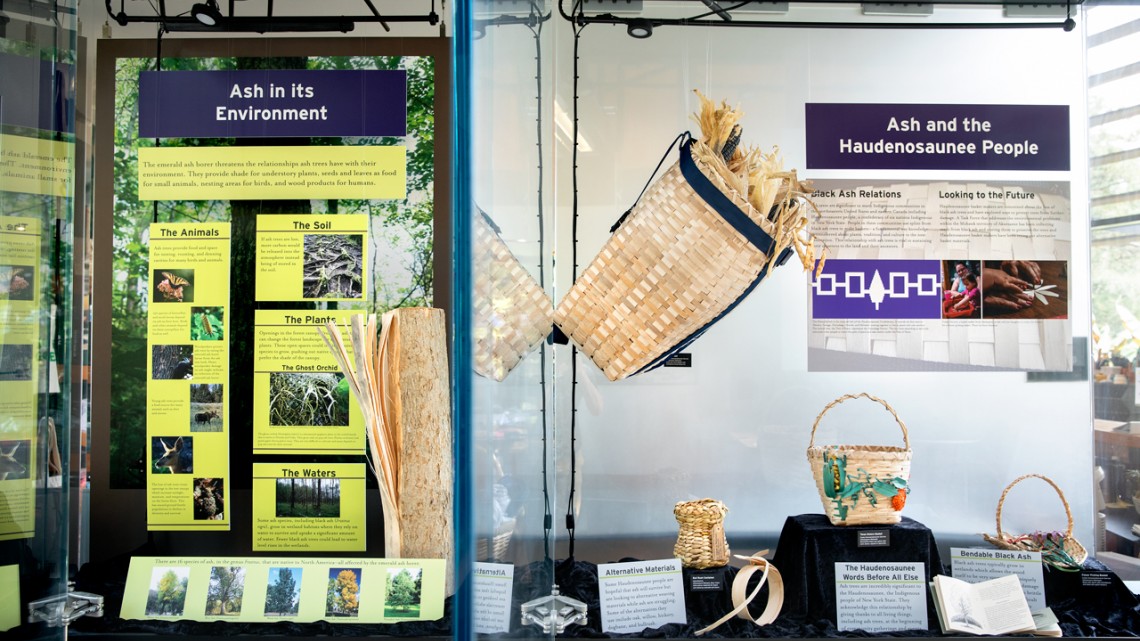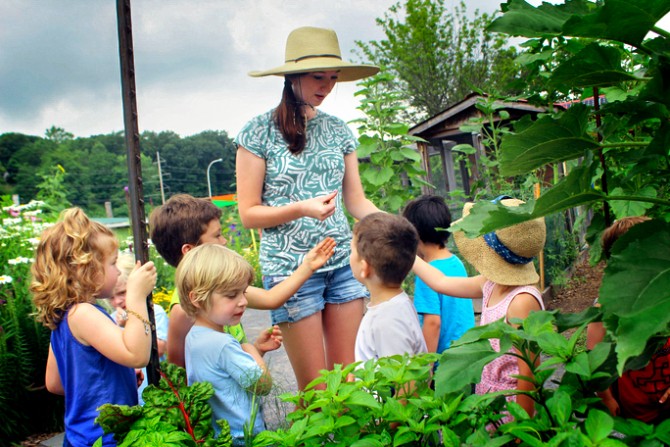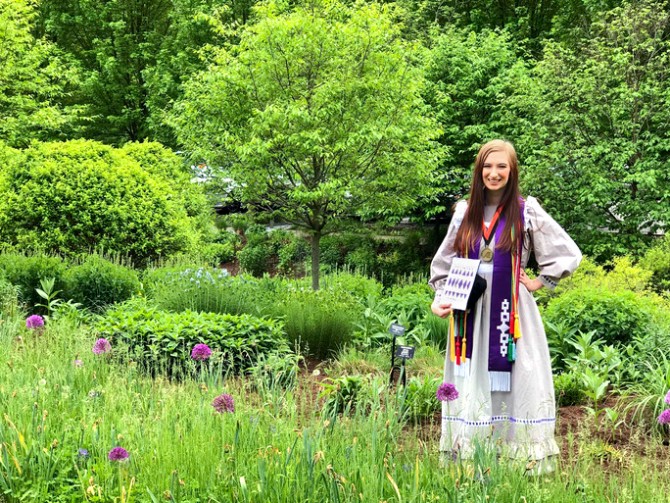
Detail of Bailee Hopkins-Hensley’s exhibit “Ash Trees: A story of relationships, loss and hope” in the Nevin Welcome Center at the Cornell Botanic Gardens.
Bailee Hopkins-Hensley is connecting people to plants
By Linda Copman
Bailee Hopkins-Hensley ’18, MPS ’19, is passionate about exploring the connections that humans have to plants – especially the connections that indigenous communities have to the species that sustain them. She earned a bachelor’s degree in plant science in 2018 and a Master of Professional Studies in public garden leadership in 2019, but her interest in plants started when she was a child.
Her grandfather loved plants, and Hopkins-Hensley recalls his extensive gardens, both outside and in three rooms that were converted into a conservatory inside their Colorado home. He grew cacti inside and food plants outside. At age 12, she planted her first backyard garden.
“I wanted to explore the types of plants that my ancestors from my mom’s side of my family had planted to sustain themselves,” says Hopkins-Hensley. “I became very interested in the Three Sisters cropping system and tried growing squash, pumpkins and sunflowers.”
Cornell Botanic Gardens, in partnership with Cornell’s School of Integrative Plant Science, offers a one-year MPS program for individuals interested in leading botanic gardens and similar organizations.
For her MPS capstone project, Hopkins-Hensley researched the detrimental impacts of the emerald ash borer, a nonnative beetle, on native ash trees. She mounted an exhibit at the Nevin Welcome Center at the Cornell Botanic Gardens to showcase the relationships that ash trees have with the world around them.
New York has about 900 million ash trees – all of which are threatened by the emerald ash borer. The borer larvae feed on the inner bark, disrupting the tree’s ability to transport water and nutrients. The insects have already killed millions of ash trees and upset the complex relationships the trees have with their environment.
Healthy ash trees provide shade for understory plants, a food source for small animals, and nesting areas for birds. More than 150 species of butterflies and moths depend on ash trees as their host, and birds and other animals depend on these insect larvae for food. Ash trees help sustain wetlands across the Northeast and eastern Canada, and they play a significant role in sustaining indigenous communities in this region.
Indigenous communities use black ash bark for their basketry, and the emerald ash borer threatens this practice and transfer of knowledge to the next generation. “The loss of ash trees will deeply impact North American indigenous communities,” Hopkins-Hensley says.
She hopes that by educating people about the role that plants play in supporting natural communities, they will be inspired to better “protect our Earth and the other beings that live among us.” She also hopes public garden professionals will engage with local communities to create accurate interpretive exhibits that celebrate the value of native plants.
Hopkins-Hensley first learned about Cornell at the Choctaw Nation of Oklahoma’s college fair, where she met Kathy Halbig, the student development specialist at Cornell’s American Indian and Indigenous Studies Program. “Her description of the diverse and welcoming community at Akwe:kon and in the student clubs Native American and Indigenous Students at Cornell and the American Indian Science and Engineering Society are what convinced to me apply,” she says.
She also was attracted by the opportunity to earn a minor in American Indian and Indigenous Studies. “I chose to attend Cornell because of the strong indigenous community – which was one of my top priorities when applying to colleges,” says Hopkins-Hensley.
Cornell’s financial aid offer sealed the deal. Grant aid and endowed scholarships covered the majority of her costs to attend Cornell. “Without the financial assistance I was provided as an undergraduate,” she says, “I might not have chosen to dive into the MPS right after graduating.”
Hopkins-Hensley received the Peter and Christine Ruppe Memorial Fellowship in Public Garden Management to help cover the cost of her graduate studies, along with external scholarships from the Choctaw Nation of Oklahoma.
During her undergraduate career, she worked as an intern at Cornell Botanic Gardens and at the Ithaca Children’s Garden, discovered the native plants of the Cayuga Lake Basin, and formed connections with the local and Cornell indigenous communities.
“The people I’ve met have helped me understand this place where I’ve lived for the past five years, and they’ve helped me understand myself as a Choctaw student and a visitor here,” she says.
Now a gardener in the Bio-cultural Conservation Farm at the Oak Spring Garden Foundation in Upperville, Virginia, Hopkins-Hensley wants to build bridges between public gardens and indigenous communities.
“I want to play a role in respectfully developing native plant gardens that promote hands-on learning and plant interaction for people of every age,” says Hopkins-Hensley. “I also want to help Native American communities build their own community gardens, and help public gardens to interpret the cultural relationships surrounding their plant collections.”
Media Contact
Get Cornell news delivered right to your inbox.
Subscribe



